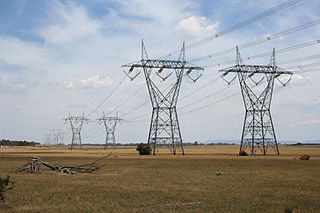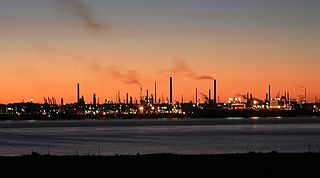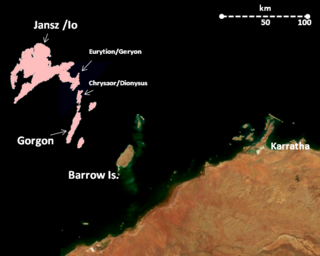
Exxon is the brand name of the oil and natural resources company Exxon Corporation which was, prior to 1972, known as Standard Oil Company of New Jersey. In 1999, Exxon Corporation merged with Mobil to form ExxonMobil. The Exxon brand is still used by ExxonMobil's downstream operations as a brand for certain gas stations, motor fuel and related products. Standard Oil Company of New Jersey was one of the Seven Sisters that dominated the global petroleum industry from the mid-1940s to the 1970s.
Mobil, previously known as the Socony-Vacuum Oil Company, was a major American oil company that merged with Exxon in 1999 to form a parent company called "ExxonMobil". It was previously one of the Seven Sisters that dominated the global petroleum industry from the mid-1940s until the 1970s.

The Stop Esso campaign was a campaign by Greenpeace, Friends of the Earth and People and Planet aimed at boycotting the oil company Esso, known as ExxonMobil in the United States, on the grounds that it is damaging the environment.

Esso is a trading name for ExxonMobil and its related companies. The company began as Standard Oil of New Jersey following the breakup of Standard Oil. In 1972, the name was largely replaced in the U.S. by the Exxon brand after the company bought Humble Oil, while the Esso name remained widely used elsewhere.

Imperial Oil Limited is a Canadian petroleum company. It is Canada's second-biggest integrated oil company. ExxonMobil has a 69.6 percent ownership stake in the company. It is a significant producer of crude oil, diluted bitumen and natural gas, Canada's major petroleum refiner, a key petrochemical producer and a national marketer with coast-to-coast supply and retail networks. It supplies Esso-brand service stations.

The Sakhalin-I project, a sister project to Sakhalin-II, is a consortium for production of oil and gas on Sakhalin Island and immediately offshore. It operates three fields in the Okhotsk Sea: Chayvo, Odoptu and Arkutun-Dagi.

Bayway Refinery is a refining facility in the Port of New York and New Jersey, owned by Phillips 66. Located in Linden and Elizabeth, New Jersey, and bisected by Morses Creek, it is the northernmost refinery on the East Coast of the United States. The oil refinery converts crude oil into gasoline, diesel fuel, jet fuel, propane and heating oil. As of 2007, the facility processed approximately 238,000 bbl/d (37,800 m3/d) of crude oil, producing 145,000 bbl/d (23,100 m3/d) of gasoline and 110,000 bbl/d (17,000 m3/d) of distillates. Its products are delivered to East Coast customers via pipeline transport, barges, railcars and tank trucks.
The Esso Longford gas explosion was a catastrophic industrial accident which occurred at the Esso natural gas plant at Longford in the Australian state of Victoria's Gippsland region. On 25 September 1998, an explosion took place at the plant, killing two workers and injuring eight. Gas supplies to the state of Victoria were severely affected for two weeks.

The State Oil Company of Azerbaijan Republic, largely known as SOCAR is fully state-owned national oil and gas company headquartered in Baku, Azerbaijan. The company produces oil and natural gas from onshore and offshore fields in the Azerbaijani segment of the Caspian Sea. It operates the country's only oil refinery, one gas processing plant and runs several oil and gas export pipelines throughout the country. It owns fuel filling station networks under the SOCAR brand in Azerbaijan, Turkey, Georgia, Ukraine, Romania and Switzerland.

On the Run is a flagship convenience store brand developed by ExxonMobil, used at Exxon and Mobil stations in the United States, BP and Mobil in Australia and at Esso and Mobil stations internationally. Alimentation Couche-Tard acquired the On the Run trademark and franchise network in the U.S. in 2009, and Parkland Fuel did the same in Canada in 2016; ExxonMobil retains full ownership of the brand in the rest of the world.

Longford is a town in the Gippsland region of Victoria, Australia. At the 2006 census, Longford and the surrounding area had a population of 929.

Qatar Petroleum (QP) is a state owned petroleum company of Qatar. The company operates all oil and gas activities in Qatar, including exploration, production, refining, transport, and storage. QP's President & CEO is Saad Sherida Al-Kaabi, Minister of State for Energy Affairs. QP's operations are directly linked with state planning agencies, regulatory authorities, and policy making bodies. Together, revenues from oil and natural gas amount to 60% of the country's GDP. As of 2018 it was the third largest oil company in the world by oil and gas reserves.

"Fossil fuels lobby" is a term used to label the paid representatives of large fossil fuel and aviation corporations who attempt to influence governmental policy. Big Oil companies such as ExxonMobil, Royal Dutch Shell, BP, Total S.A., Chevron Corporation, and ConocoPhillips are among the largest corporations associated with the fossil fuels lobby.
Papua New Guinea Gas, has been an exporter of liquefied natural gas (LNG) in Papua New Guinea since 2014. The LNG sector is important in the PNG's economy: the value of LNG exports in 2017 was estimated to be at US$3.6 billion while GDP was estimated to be at US$20.5 billion. On a global scale, PNG is a minor producer. In 2017, PNG acquired the 17th rank on the list of exporting countries; its exports covered 1.5% of the world's total exported LNG. There are five LNG projects in PNG; only the Hides Project is fully operational. An agreement was made between the PNG government and a consortium of companies to develop the second project: the "Elk/Antelope" field. These companies cooperate under the Papua-LNG project. The development of the third project, the "Pn’yang Gas Field", is in an advanced planning stage. The fourth LNG project in development is the "Western Gas" field. The fifth Gasca gasfield is offshore. The benefits of LNG development for the country is a controversial issue. Government participation in the projects is controversial and has been a dominant theme in PNG politics in the past decade. It became a major issue in the events leading to the resignation of Peter O'Neill as prime minister.

Energy in Victoria, Australia is generated using a number of fuels or technologies, including coal, natural gas and renewable energy sources. Brown coal is the main primary energy source for the generation of electricity in the state, accounting for about 85% of electricity generation in 2008. The amount of coal-fired power has decreased significantly with the closure in 2017 of the Hazelwood power station which supplied around 20% of Victoria’s electricity, and to a lesser extent with the exit of Anglesea power station in 2015. Brown coal is one of the largest contributors to Australia's total domestic greenhouse gas emissions and a source of controversy for the country. Australia is one of the highest polluters of greenhouse gas per capita in the world. In 2016, about 16% of Victoria’s electricity was from renewable sources, with a government target to increase that share to 40% by 2025. In 2019, renewable energy provided 23.9% of the state's electricity. On 28 March 2021, Victoria reached 50% renewable energy.

Fawley Refinery is an oil refinery located at Fawley, Hampshire, England. The refinery is owned by Esso Petroleum Company Limited, a subsidiary of Exxon Mobil Corporation, which acquired the site in 1925. Situated on Southampton Water, it was rebuilt and extended in 1951 and is now the largest oil refinery in the United Kingdom, and one of the most complex refineries in Europe. With a capacity of 270,000 barrels (43,000 m3) per day, Fawley provides 20 percent of the UK's refinery capacity. An estimated 1000 people are employed at the site.

The Gorgon gas project is a multi-decade natural gas project in Western Australia, involving the development of the Greater Gorgon gas fields, subsea gas-gathering infrastructure, and a liquefied natural gas (LNG) plant on Barrow Island. The project also includes a domestic gas component. Construction was completed in 2017.
Exxon Mobil Corporation, stylized as ExxonMobil, is an American multinational oil and gas corporation headquartered in Irving, Texas. It is the largest direct descendant of John D. Rockefeller's Standard Oil, and was formed on November 30, 1999 by the merger of Exxon and Mobil. ExxonMobil's primary brands are Exxon, Mobil, Esso, and ExxonMobil Chemical. ExxonMobil is incorporated in New Jersey.
Puma Energy is a Singaporean multinational mid- and downstream oil company, majority-owned by the Singaporean Trafigura and the Angolan Sonangol Group.
The ExxonMobil climate change controversy concerns ExxonMobil's activities related to global warming, especially their opposition to established climate science. Since the 1970s, ExxonMobil engaged in climate research, and later began lobbying, advertising, and grant making, some of which were conducted with the purpose of delaying widespread acceptance and action on global warming.













